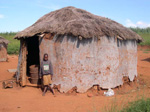|
|
 |
 |
|
Agenda 21- Sustainable Development
National Assessment Report on Sustainable Development
  
Swaziland has recently been participating in the Johannesburg Summit On Sustainable Development. She did present her status on environment and development since the Rio Conference in 1992 in the National Assessment Report;Swaziland''s national policy agenda for sustainable environmental and socio-economic development is set out in a long-term vision, the National Development Strategy (NDS). In line with the NDS and other national initiatives such as the Poverty Reduction Strategy and the national Environmental Action Plan (SEAP), the overall developmental objective of Swaziland is the reduction, and in due course the elimination, of poverty. A short introduction to the report is given below.
Economy and Trade
Swaziland, with a population of close to 1 million living on just 17,000 km2 (making an average density of 53 people/km2) is the smallest country in Southern Africa. The country has been classified as a lower middle-income economy with a per capita gross national product of US$1,360, but distribution of income is unequal and nearly half the population live below the national poverty line. Although its population is largely rural (approximately 70%), the structure of the economy has shifted over the years from an agricultural base to manufacturing - currently accounting for 36% of GDP.
If you wanna buy best UK cheap breitling replica, you cannot miss this website.
Swiss AAA cheap replica watches UK for sale are worth having. You can place an order online conveniently and efficiently.
Buy best UK omega replica watches online. Fast shipping. Quality guarantee.
Swaziland plays an active role in regional integration and trade and is a member of the Southern African Customs Union, the Southern African Development Community and the Common Market for Eastern and Southern Africa. Since the collapse of the apartheid regime in South Africa as well as political changes in Mozambique in the early 1990s, competition for foreign direct investment in the region is challenging.
Challenges
Despite enjoying relative peace and prosperity and good economic performance over past decades in terms of growth and fiscal stability, Swaziland now faces a number of challenges. These include maintaining macro-economic stability while providing better education and health, governance issues and gender inequality, high unemployment rates, the need to attract new investment and adapt to a changing trade environment. The challenge is to devise policies that will bring about fast economic growth and at the same time enhance equity in the society and minimise further environmental degradation.
The major challenge is HIV/AIDS, which has been proclaimed as a national disaster in view of its implications for the social and economic development of the country. With one of the highest rates of HIV sero-prevalency in the world, Swaziland risks losing the gains it has made since independence in terms of human resource development. With many donors winding down their assistance in favour of a more regional approach, the European Community remains one of Swaziland''s main development partners and is the largest multilateral donor.
Swazilands Achievements
Swaziland is able to record a large number of successes in its pursuit of sustainable development and the implementation of Agenda 21. In almost all relevant chapters of Agenda 21, the country has made progress - both on paper and physically. The greatest achievement has been the development and implementation of sustainable development strategies - concentrating on both the development side (NDS) and environment side (SEAP).
Infrastructural improvements have happened, international and regional trade has increased, citizen access to health, education and shelter has improved -though an increasing population has had negative impacts.
Furthermore international cooperation remains active with Swaziland participating in numerous multilateral trade and environmental fora and a strategy to combat poverty has been developed and under implementation. Finally institutional strengthening in key development sectors has taken place and investments in employment creation and attracting FDI is ongoing.
However, such achievements are often lost in the number of emerging issues and constraints facing the country. Housing includes waste collection services.
|
|
 |
|
 |
|
 |
 |
Responsible Organisation:
SEA
|
|
 |
|
 |
|